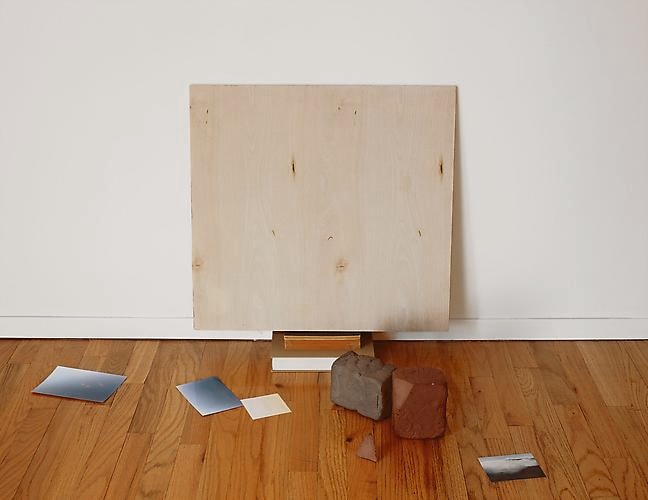D'Amelio Terras is pleased to present a solo exhibition comprised of new work by Leslie Hewitt, on view from October 29 through December 23, 2011.
Continuing the formal innovation started with the Make It Plain Series and the Midday Series, Hewitt's photographs rest in sturdy wooden frames leaning against the wall and invite the viewer to experience a unique space between photography and sculpture. Hewitt's way of working documents temporary still life structures that combine political, social and personal material within sculptural compositions, repeatedly re-arranged and photographed over time to capture the most subtle shifts in perception.
The subdued monumentality of these evenly paced photo sculptures resists a culture of the accelerated circulation of images. Through photography's ability to document, Hewitt dissects the representation of a specific situation: rather than freezing an isolated moment, it is the passage of time that is made visible through the variation of daylight on walls, objects and floors. The central axis in the compositions is occupied by a raw plywood square that acts as a blank screen obscuring the path towards a linear narrative.
Hewitt's practice responds to an introspective questioning: how can a photograph made in restrained studio conditions with the permutation of limited elements reflect something larger than what is actually pictured? This perspective is amplified, for example by the presence of a worn and occasionally turned copy of the Politics of Protest, 1969, a report researched and compiled by the United States Commision on the Causes and Prevention of Violence, that serves along side other non-descript books to form the structural foundation in each photographed arrangement. Additionally, imagining how such textural references in her compositions stand in relation to the civil resistance movements witnessed earlier this year in North Africa and continued into the Middle East are part of the contemplative undertone of this work.
In previous iterations of these photo sculptures, common objects point to the socio-economic framework of Dutch still life. With Blue Skies, Warm Sunlight these take new form: figures in the snapshots are minimal and stmospheric and where absent altogether, they are replaced by clouds and skies, dispersed geometric elements like rectangular books, turned photographs, and a more compliant material such as clay appears for the first time in her pictured sculptures. The timeliness of Hewitt's precariously balanced works point to an interesting reciprocity between text and image, each leading to ways of opening the metaphoric, lyrical and critical stance of this new series.
Leslie Hewitt was a participant in the 2008 Whitney Biennial and was featured in New Photography 2009 at the Museum of Modern Art in New York. Recent exhibitions include "Leslie Hewitt: Riffs on Real Time" at the Institute of Contemporary Art Boston and "Human Nature, Contemporary Art from the Collection" at the Los Angeles County Museum of Art. In 2012, the artist will attend the American Academy in Berlin and have a solo exhibition at the Contemporary Art Museum St. Louis. Leslie Hewitt was the 2009-2010 Mildred Londa Weisman Fellow at the Radcliffe Institute for Advanced Study at Harvard University and the 2010 recipient of the Joyce Alexander Wein Prize awarded by the Studio Museum in Harlem.
Presently, Hewitt is working on her second film installation in collaboration with cinematographer Bradford Young and film producer Karin Chien. It is co-founded by the Des Moines Art Center, The Menil Collection and the Museum of Contemporary Art Chicago. Her work is represented in the public collections of the Museum of Modern Art, New York; the Solomon R. Guggenheim Museum, New York; The Studio Museum in Harlem, New York; the Los Angeles County Museum of Art, Los Angeles; the Walker Art Center, Minneapolis; and the Fogg Art Museum at Harvard University, Cambridge, among other institutions.

